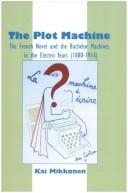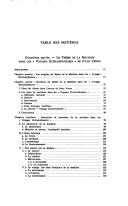| Listing 1 - 10 of 19 | << page >> |
Sort by
|
Book
Year: 2004 Publisher: Cambridge ; New York Cambridge University Press
Abstract | Keywords | Export | Availability | Bookmark
 Loading...
Loading...Choose an application
- Reference Manager
- EndNote
- RefWorks (Direct export to RefWorks)
Humanism in literature --- Machinery in literature --- Mechanics in literature

ISBN: 3540558160 0387558160 3642777139 3642777112 Year: 1993 Publisher: Berlin Springer
Abstract | Keywords | Export | Availability | Bookmark
 Loading...
Loading...Choose an application
- Reference Manager
- EndNote
- RefWorks (Direct export to RefWorks)
Philosophy and psychology of culture --- Machinery in literature --- Metaphor --- 681.3*Km --- Parabole --- Figures of speech --- Reification --- Computerwetenschap--?*Km --- Machinery in literature. --- Metaphor.
Book
ISBN: 9781350303843 9781350077591 9781350077621 9781350077607 9781350077614 1350077623 1350077607 1350077593 Year: 2022 Publisher: London Bloomsbury Academic
Abstract | Keywords | Export | Availability | Bookmark
 Loading...
Loading...Choose an application
- Reference Manager
- EndNote
- RefWorks (Direct export to RefWorks)
"Technical automation - the ability of manmade (or god-made) objects to move and act autonomously - is not just the province of engineering or science fiction. In this book, Maria Gerolemou, by taking as her starting point the close semantic and linguistic relevance of technical automation to natural automatism, demonstrates how ancient literature, performance and engineering were often concerned with the way nature and artifice interacted. Moving across epic, didactic, tragedy, comedy, philosophy and ancient science, this is a brilliant assembly of evidence for the power of 'automatic theatre' in ancient literature. Gerolemou starts with the earliest Greek literature of Homer and Hesiod, where Hephaestus' self-moving artefacts in the Iliad reflect natural forces of motion and the manufactured Pandora becomes an autonomous woman. Her second chapter looks at Greek drama, where technical automation is used to augment and undermine nature not only through staging and costume but also in plot devices where statues come to life and humans behave as automatic devices. In the third chapter, Gerolemou considers how the philosophers of the 4th century BCE and the engineers of the Hellenistic period with their mechanical devices contributed to a growing dialogue around technical automation and how it could help its audience glance and marvel at the hidden mechanisms of self-motion. Finally, the book explores the ways technical automation is employed as an ekphrastic technique in Late Antiquity and early Byzantium"-- Provided by publisher.
Greek literature --- Technology in literature. --- Machinery in literature. --- Robots in literature. --- Automatic machinery --- Technology --- History and criticism. --- History --- Technology in literature --- Machinery in literature --- History and criticism

Abstract | Keywords | Export | Availability | Bookmark
 Loading...
Loading...Choose an application
- Reference Manager
- EndNote
- RefWorks (Direct export to RefWorks)
French literature --- anno 1800-1999 --- French fiction --- Machinery in literature --- History and criticism
Book
Year: 1987 Publisher: Bordeaux : Presses universitaires de Bordeaux,
Abstract | Keywords | Export | Availability | Bookmark
 Loading...
Loading...Choose an application
- Reference Manager
- EndNote
- RefWorks (Direct export to RefWorks)
Inventions --- Inventions. --- Literature and technology. --- Machinery in art. --- Machinery in literature. --- History --- 1500-1599.
Book
ISBN: 0198792387 9780198792383 Year: 2017 Publisher: Oxford, United Kingdom : Oxford University Press,
Abstract | Keywords | Export | Availability | Bookmark
 Loading...
Loading...Choose an application
- Reference Manager
- EndNote
- RefWorks (Direct export to RefWorks)
Eighteenth-century fiction is full of mechanical devices and contrivances: Robinson Crusoe uses his gun and compass to master his island and its inhabitants; Tristram Shandy's conception is interrupted by a question about a clock and he has his nose damaged at birth by a man-midwife's forceps; Ann Radcliffe's gothic heroines play musical instruments to soothe their troubled minds. In Novel Machines, however, Joseph Drury argues that the most important machine in any eighteenth-century novel is the narrative itself. Like other kinds of machine, a narrative is an artificial construction composed of different parts that combine to produce a sequence of causally linked actions. Like other machines, a narrative is designed to produce predictable effects and can therefore be put to certain uses. Such affinities had been apparent to critics since Aristotle, but they began to assume a particular urgency in the eighteenth century as authors sought to organize their narratives according to the new ideas about nature, art, and the human subject that emerged out of the Scientific Revolution.
English fiction --- Machinery in literature. --- Narration (Rhetoric). --- Technology in literature. --- History and criticism
Book
ISBN: 9780810128941 0810128942 Year: 2013 Publisher: Evanston (Ill.) : Northwestern university press,
Abstract | Keywords | Export | Availability | Bookmark
 Loading...
Loading...Choose an application
- Reference Manager
- EndNote
- RefWorks (Direct export to RefWorks)
Art and technology. --- Arts, Russian --- Avant-garde (Aesthetics) --- Machinery in literature. --- Russian literature --- History --- History and criticism
Book
ISBN: 0810166526 9780810166523 0810128942 9780810128941 Year: 2013 Publisher: Evanston, Illinois : Northwestern University Press,
Abstract | Keywords | Export | Availability | Bookmark
 Loading...
Loading...Choose an application
- Reference Manager
- EndNote
- RefWorks (Direct export to RefWorks)
Longlist finalist, 2015 Historia Nova Prize for Best Book on Russian Intellectual and Cultural History In post revolutionary Russia, as the Soviet government pursued rapid industrialization, avant-garde artists declared their intent to serve the nascent state and to transform life in accordance with their aesthetic designs. Despite their utilitarian intentions, however, most avant-gardists rarely created works regarded as practical instruments of societal transformation. Exploring this paradox, Vaingurt claims that the artists' fusion of technology and aesthetics prevented their creations from being fully conscripted into the arsenal of political hegemony. The purposes of avant-garde technologies, she contends, are contemplative rather than constructive. Looking at Meyerhold's theater, Tatlin's and Khlebnikov's architectural designs, Mayakovsky's writings, and other works from the period, Vaingurt offers an innovative reading of an exceptionally complex moment in the formation of Soviet culture.--
Machinery in literature. --- Art and technology. --- Arts, Russian --- Russian literature --- Avant-garde (Aesthetics) --- History and criticism. --- History

ISBN: 2714300170 9782714300171 Year: 1981 Publisher: Paris : José Corti,
Abstract | Keywords | Export | Availability | Bookmark
 Loading...
Loading...Choose an application
- Reference Manager
- EndNote
- RefWorks (Direct export to RefWorks)
Fiction --- Thematology --- Verne, Jules --- Zola, Emile --- Villiers de l'Isle-Adam, de, Auguste --- Machinery in literature --- French fiction --- History and criticism --- French fiction - 19th century - History and criticism

ISBN: 9789004485716 9789042015968 9042015969 Year: 2001 Publisher: Leiden; Boston : BRILL
Abstract | Keywords | Export | Availability | Bookmark
 Loading...
Loading...Choose an application
- Reference Manager
- EndNote
- RefWorks (Direct export to RefWorks)
This book presents a new and exciting theory of the modern French novel by developing the notion of the narrative as a "textual machine". Many turn-of-the-century French novels thematically identified their means of narration through the various machines that they depicted. The narrative devices that were particularly important in this self-reflection included: the temporal order of the plot, the question of a narrative's beginning and end, the hierarchy of narrative voices, and the techniques of the point of view. The question of mechanization became central on all these fronts. Has the novel become automated or machine-like? At the same time, the machine metaphors in the novels of Alfred Jarry, Emile Zola, Jules Verne, Villiers de l'Isle-Adam, Raymond Roussel combined the question of the narrative form with new ways to think about man's relationship with technology and the cultural environment. The early modernist texts drew upon contradictory notions of technological promise and threat while they also depicted new forms of identity and behavior, related to or modeled after machines. These texts highlighted cultural assumptions concerning technological innovations and critiqued, mainly through parody and through various figures of man-machine fusion, the positivistic belief in progress. Such writers looked for evidence of advanced forms of consciousness arising out of encounters with new technology such as: telephones, trains, bicycles, telegraphy, phonographs and electricity. This volume will be of interest to anyone working in the field of modern French literary and cultural history. It will especially appeal to anyone intrigued with the origins of the modernist novel, the history of narrative forms, and the question of how the experience of new technology may be portrayed in literary texts.
| Listing 1 - 10 of 19 | << page >> |
Sort by
|

 Search
Search Feedback
Feedback About UniCat
About UniCat  Help
Help News
News